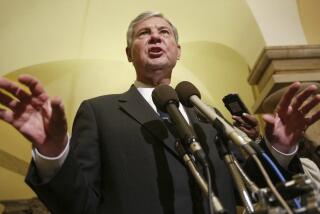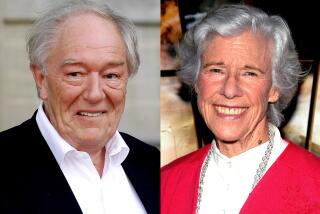PASSINGS: Henri Lazarof, Elizabeth Jane Howard, George Goodman, Carter Camp
- Share via
Henri Lazarof
Composer, teacher and art collector
Henri Lazarof, 81, a prolific composer and teacher who may have been best known for the modern art collection he and his wife amassed, died Sunday at his home in Los Angeles. The cause was Alzheimer’s disease, said his wife, Janice Lazarof.
The Lazarofs significantly bolstered the modern art collection of the Los Angeles County Museum of Art in 2005 when they gave 130 works — including pieces by Pablo Picasso, Paul Klee, Henry Moore, Alberto Giacometti and others — to the institution. When the collection went on display in 2008, Los Angeles Times art critic Christopher Knight called it an “extraordinarily munificent gift” that was “instrumental in greatly elevating the museum’s Modern holdings.”
“At a time when the art market has made it nearly impossible for museums to purchase works of this quality,” said LACMA Chief Executive Michael Govan at the time, “this important acquisition brings to the people of Los Angeles works by key figures that define the modern century.”
Janice Lazarof, the daughter of financier and philanthropist S. Mark Taper, said she and her husband wanted the works to go to a local institution. “We had a long relationship with LACMA,” she said. “We just felt that’s where it belonged.”
Henri Lazarof was born April 12, 1932, in Sofia, Bulgaria. He studied in Tel Aviv and Rome before coming to the U.S. to attend Brandeis University. In 1966, Lazarof began teaching music composition and French language classes at UCLA. He had 126 compositions published, several of which were recorded on CDs, said Janice Lazarof.
Many of the local performances of the works were conducted by the composer. In a 1989 review of recent pieces by Lazarof, Times critic Daniel Cariaga said the music resisted “easy descriptions.” He said the works were “deeply connected to the traditions of Brahms and Ravel (and others), but articulate of contemporary musical sensibilities.”
Elizabeth Jane Howard
Author of ‘The Cazalet Chronicles’
Elizabeth Jane Howard, 90, whose saga of a wealthy English family living in the shadow of war enchanted readers a generation ahead of “Downton Abbey,” died Thursday at her home in Bungay, England, her friend and publicist Jacqui Graham said. No cause was given.
In a whirlwind life, Howard wrote 15 novels, left three marriages, modeled, acted, worked as a broadcaster and did much more. Many of her books were critical successes, but she was best known for “The Cazalet Chronicles,” which followed the tangled lives and loves of several generations of an aristocratic household in the run-up to World War II. The books were adapted for a 2001 public television program.
Graham described Howard as “remarkably odd, and interesting, and fabulous, and brave.”
“She walked away from a marriage, which was a very advantageous one, to do what she wanted to do, which was write. She lived her life in a way that she wanted to live it in, in a way that women at that time just didn’t have the nerve. She had the nerve.”
Born March 26, 1923, in London, Howard had little in the way of formal education, but she read voraciously. At 19 she married Peter Scott, the son of Capt. Scott, the famous polar explorer, a wedding that would mark the start of a long and tumultuous love life. She would ultimately marry and divorce three times — to Scott, and to writers Jim Douglas-Henry and Kingsley Amis. Graham said it was Howard who ended all three relationships.
Howard’s work included “The Beautiful Visit,” a coming-of-age novel structured around World War I, and “Mr. Wrong,” a collection of short stories centered on the lives of 1960s London women, and “The Cazalet Chronicles,” a series of books that followed the eponymous upper-crust dynasty from the carefree ‘30s into World War II and beyond.
“It preceded, by a long way, ‘Downton Abbey,”’ said Graham. “People love reading family sagas set slightly in the past — not too far back (but) close enough for you to touch, within living memory. She unconsciously got that.”
Howard’s literary legacy also lives on through her stepson, writer Martin Amis, who credited her with steering him to serious literature.
George Goodman
Wrote economics books as ‘Adam Smith’
George Goodman, 83, a journalist, business author and award-winning television host who, under the pseudonym “Adam Smith,” made economics accessible to millions, died Friday at the University of Miami Hospital after battling the bone marrow disorder myelofibrosis, said his son, Mark Goodman.
The elder Goodman had a long, diverse and accomplished career starting in the 1950s, co-founding New York magazine and becoming a best-selling business author and host of “Adam Smith’s Money World.” The program aired on PBS stations from 1984 to 1996.
He prided himself on making arcane debates among economists and business leaders understandable, often using an anecdotal or irreverent approach to explain a complicated issue. He has been credited with coining the mocking catchphrase, “Assume a can opener,” as a parody of academic jargon.
Before his success in the business world, Goodman had written novels and worked in Hollywood as a screenwriter. He helped adapt his own book, “The Wheeler Dealers,” into a movie of the same name starring Lee Remick and James Garner.
Smith’s first business book, “The Money Game,” was among the top sellers of 1968 and is still praised as an invaluable guide for investors. It was also his first work as “Adam Smith.” Founding New York magazine editor Clay Felker had persuaded him to name himself after the 18th century economist. His other books included “Powers of Mind” and “Paper Money,” published in 1981.
Born Aug. 10, 1930, Goodman grew up outside St. Louis and graduated from Harvard University in 1952. He was later a Rhodes scholar studying political economy at Oxford University and a member of the U.S. Army Special Forces.
Carter Camp
American Indian activist
Carter Camp, 72, a onetime activist with the American Indian Movement who was a leader in the Wounded Knee occupation in South Dakota, died Dec. 27 in White Eagle, Okla., said his sister, Casey Camp-Horinek. He had cancer.
Camp, a member of the Ponca tribe of Oklahoma, was a member of the American Indian Movement, organizing chapters in his home state of Oklahoma. The American Indian Movement was founded in the late 1960s to protest the U.S. government’s treatment of Native Americans and demand that the government honor its treaties with Indian tribes.
He had a leading role in the Trail of Broken Treaties in 1972, in which a caravan of Native American activists drove across the country to Washington, D.C., to protest treaties between tribes and the federal government. They took over the Bureau of Indian Affairs for several days.
The next year, Carter headed to South Dakota with other AIM leaders, including Russell Means and Dennis Banks. There they organized the Wounded Knee uprising, a 71-day siege that included several gun battles with federal officers. Means died in 2012.
Although several people in leadership roles went on trial for events that took place at Wounded Knee, Camp was the only one to serve time. He spent two years in prison in Leavenworth, Kan., for assaulting a postal inspector, a charge Camp-Horinek disputes.
Camp later left the organization.
In recent years, Camp’s focus turned to the Keystone XL pipeline, which he bitterly opposed. Once completed, the contested pipeline will carry tar sands oil from Canada down the midsection of the country and into Texas.
Times staff and wire reports
trial for events that took place at Wounded Knee, Camp was the only one to serve time. He spent two years in prison in Leavenworth, Kan., for assaulting a postal inspector, a charge Camp-Horinek disputes.
Camp later left the organization.
In recent years, Camp’s focus turned to the Keystone XL pipeline, which he bitterly opposed. Once completed, the contested pipeline will carry tar sands oil from Canada down the midsection of the country and into Texas.
Times staff and wire reports
More to Read
Start your day right
Sign up for Essential California for the L.A. Times biggest news, features and recommendations in your inbox six days a week.
You may occasionally receive promotional content from the Los Angeles Times.






